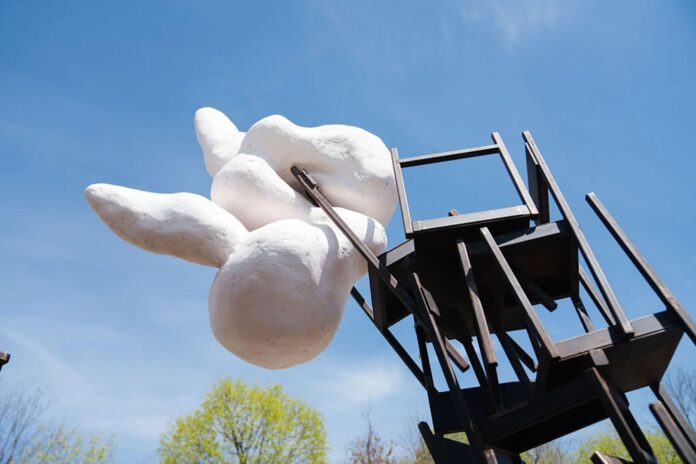“What happens if the art object isn’t a polite object, but rather an unwelcome guest? For a long time I’ve been considering where art ends up and who it is for,” the British sculptor Phyllida Barlow said, as she was finishing a series of steel and fibreglass sculptures, her first large-scale outdoor pieces fabricated in durable materials. These works, commissioned for a Public Art Fund exhibition in New York City, are also Barlow’s last, following her sudden death in March at the age of 78.
PRANK opens on 6 June (until 26 November) in City Hall Park in Lower Manhattan, where, before her death, Barlow had mapped out the siting of her seven new sculptures. Called antic, hoax, jape, jinx, mimic, stunt and truant, each is an assemblage of precariously stacked furniture that is seemingly being scaled by a playful, anthropomorphic motif that Barlow called “rabbit ears”.
“They all suggest sort of naughty behaviour or something that’s a bit leftfield,” says Nicholas Baume, the Public Art Fund’s artistic and executive director and curator of the show. “Phyllida was always interested in her work making you do a double take, in pushing the limits.”
Long based in London, Barlow was an influential teacher, including during her 23 years as a professor at the Slade School of Art, before receiving her own acclaim later in life—most notably in 2017, when she took over the British Pavilion at the Venice Biennale. She flouted sculptural convention and pretension by making monumental installations in what she called “crap materials”, including inexpensive cardboard, plywood, fabric and cement.
When the Public Art Fund initially proposed creating a project after her first US museum show in 2012, at the New Museum, “it took a long time for Phyllida to get her head around how she would approach a body of work that would, by necessity, have such different materials from what she normally used”, says Baume. Eventually, the conversation led to her revisiting the form of her oversized “rabbit ears”, first made in white plaster and propped on domestic items such as a television or an ironing board in her 1990s series Objects for, which satirised the phallic nature of much sculpture.
“That’s a huge contribution on her part, to really expand the notion of what sculpture is,” Baume says. “It can articulate a critique of the self-importance and self-aggrandising character of outdoor sculpture, as it’s having a great time and making us all giggle.”
For the works in PRANK, Barlow’s “rabbit-ears” motif transformed into an eccentric animated creature in fibreglass that seems to explore the unwieldy steel accumulations: leaning towers of chairs and desks, teetering rafts of sofas and pianos, a wonky phalanx of studio lockers. Baume sees the “rabbit ears” as gender fluid. “They capture shared human characteristics and foibles,” he says, “whether a love of showing off—one appears sort of pirouetting like a dancer—or perhaps laziness, where another one looks like it’s having a nap.”
Baume adds: “I sense Phyllida’s personality, her spirit so deeply in the work.”
- Phyllida Barlow: PRANK, 6 June-26 November, City Hall Park, New York

























